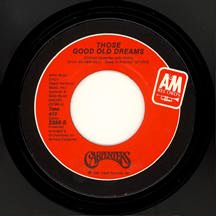This article needs additional citations for verification .(July 2019) |
| "Those Good Old Dreams" | ||||
|---|---|---|---|---|
 | ||||
| Single by Carpenters | ||||
| from the album Made in America | ||||
| B-side | "When It's Gone (It's Just Gone)" | |||
| Released | December 1981 | |||
| Recorded | 1981 | |||
| Studio | A&M Studios (Los Angeles, CA) [1] | |||
| Genre | Pop, Country | |||
| Length | 4:12 | |||
| Label | A&M 1940 | |||
| Songwriter(s) | Richard Carpenter / John Bettis | |||
| Producer(s) | Richard Carpenter | |||
| Carpenters singles chronology | ||||
| ||||
"Those Good Old Dreams" is a song by The Carpenters. Its B-side is "When It's Gone (It's Just Gone)", a song released on the Made in America album in 1981.
Contents
The song talks of reliving dreams and feelings of romantic love held long ago ("It's a new day for those good old dreams / One by one it seems they're coming true").